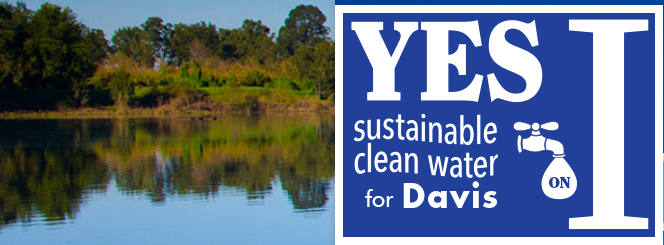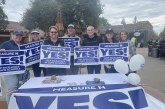
Davis’ Mayor Joe Krovoza writes in an op-ed, “No Davis issue has aroused as much passion and debate in recent years as the Measure I campaign.”
And while he might be forgetting past city debates on land use and other issues of passion, Measure I is certainly up there in terms of scrutiny, debate and intensity. He adds, “As is certainly the case for every citizen, the future of our community water supply is of intense interest to my fellow council members and me. “
“Weighing heavily on all of us has been balancing our community’s need for a better source of water with the project costs and our fiduciary responsibility as civic leaders,” the mayor adds. “We have all looked for the optimal long-term solution to bring reliable and clean water to our community.”
At the core he argues that there is one “unshakable truth” that remains: “There is no lower cost, true solution; there is no way to protect our groundwater without an assist from the Sacramento River; our environmental values dictate that we accept our responsibility to discharge clean water into our waterways and wetlands.”
As WAC Chair Elaine Roberts Musser argued in a piece co-written by Helen Thomson, Jerry Adler, Alf Brandt, Steve Boschken, Jim West and Jane Rundquist, “The objective of the Woodland-Davis surface water project is to create a safe, sustainable and reliable source of clean water for our community.”
“Many extremely qualified experts testified before the Water Advisory Committee, a group of knowledgeable citizens tasked to look closely at the water issue in Davis,” they wrote in an op-ed from early February. “Every one of those experts who spoke before the WAC agreed Davis needs a conjunctive-use project, using both ground and surface water. Every single WAC member concurred with a conjunctive-use project, in a unanimous vote.”
Their core argument was that if Davis failed to implement this project, “the city would not be acting in a fiscally responsible manner.”
Toward that end, they argued, “The city of Davis cannot sustain its present course of action. The city has been borrowing money on an existing line of credit to pay for its crumbling water infrastructure. This is because necessary water rate increases have been put on hold while decisions are being made on the best course of action.”
“Wells had to be taken off line because of contamination or subsidence problems,” they noted, before Well 30 was taken off line due to contamination.
They argued that delay would result in escalated costs for construction and financing, as the current economic downturn has led to “an enormously favorable bidding climate for a large project of this type.”
“The city needs to take advantage of these conditions and exploit that benefit to the fullest,” they argue.
Moreover, “If voters fail to approve the surface water project, Davis runs the risk of being out of compliance with federal and state regulatory requirements now and in the future. The policy and legal trends are toward more stringent water quality and wastewater discharge requirements to protect the environment.”
“Regionally partnering with Woodland makes sound economical sense. It is of mutual benefit to both cities, saving each of them a considerable amount of money,” they continue.
Moreover, the size and scope of the project has been reduced.
“The result has been to decrease costs considerably to the customer. Davis is paying only its fair share of the Woodland-Davis Surface Water Project, the portion the WAC itself requested and deemed equitable,” they argue.
“The days of ‘cheap’ water in California are over,” they continue. “The fact is that every community in California must grapple with ever more stringent federal and state regulatory standards. Drought, the collapse of wells and subsidence are serious considerations that all municipalities must take into account as well. If Davis doesn’t have a safe, reliable and sustainable supply of clean water, then homes, schools, parks, businesses, all property values and the entire local economy will suffer as a result.”
They quote from Graham Fogg, the UC Davis professor of hydrology who testified before the WAC.
“When I came to Davis 23 years ago, there was a prevailing view that the water quality in the intermediate aquifer was invulnerable because there was layer after layer of clay and silt overlaying the aquifer, and that groundwater recovers every year. … In the ’90s, I started predicting what was going to be happening to water quality … and unfortunately my predictions are coming true,” he told the WAC.
“We are seeing deeper and deeper migration of contamination,” he said. “I’ve seen it before. The thinking then was it is a big confined aquifer, it’s protected, and it’s invulnerable.”
“But guess what?” he continued. “At the rate of about … a well every two years … for the past 15 years in Davis, you’re seeing adverse impacts. … So … I do hate to see a mistake made twice. … I think it would be a mistake to assume that the deep aquifer is invulnerable, will stay clean indefinitely …”
Ms. Musser, et al. argue, “As a consequence of independent expert testimony and after extensive committee deliberations, the WAC unanimously approved a conjunctive-use project. Other options were thoroughly investigated in an exhaustive process. The Woodland-Davis Surface Water Project was determined to be the best alternative. The City Council unanimously agreed. To delay is to ignore community consensus and the facts, endangering our future water supply for generations to come.”
“Given the WAC’s work, there can’t be any misunderstanding: this project is needed, and now,” Mayor Joe Krovoza argues.
“The cities will own and control the project. Period. We aren’t giving up ownership or control. We will contract for the plant’s operation – with full ability to cancel the contract if there are problems,” he continues. “Costs will be lower and ratepayers will have greater certainty. We make contracts like this for many city services like parks maintenance, garbage and recycling. Be assured, privatization concerns based on experiences in other communities will be protected against in our contracts.”
“Recent events have reinforced my view that continued long-term and exclusive reliance on either our intermediate or deep aquifer is irresponsible,” he wrote.
He continued, “In recent years, our 14 intermediate aquifer wells have continued to suffer degradation due to increased contamination. Since 2003, the City has had to take five wells offline because of excessive levels of nitrates, selenium, and total chromium. Our remaining intermediate aquifer wells have seen consistently increasing nitrate levels for the past ten years.”
“Some have suggested we can rely solely on our deep aquifer,” he wrote. “That, too, would come at great cost and uncertainty. While the deep aquifer does not have the same problem with contamination due to nitrates, selenium and chromium-6, our deep aquifer suffers with excessive levels of manganese.”
He noted that Well 30 was taken offline due to manganese contamination.
In summary, he argues, “Davis must not spend money on a system that doesn’t promise us a long-term fix.”
He concludes, “A YES vote on Measure I brings us surface water for the majority of our water needs, employing only deep aquifer wells for backup and peak summer needs. This is why our citizens’ Water Advisory Committee overwhelmingly recommended the proposed cost-saving partnership with Woodland.”
“This is why every local elected official who represents Davis has endorsed Measure I,” the mayor writes.
—David M. Greenwald reporting






Rememver to vote by 8 pm tonight, at VMC or Main Library
Please vote NO.
And remember to mail your Prop 218 protests. The City Clerk has to receive then by March 19 Stop the unfair and unaffordable rate hikes.
So the No on I campaign ends without ever refuting or disproving any of the myriad of scientific evidence that indicates that we will be unable to rely on the deep aquifer as our sole source of water. They end the campaign without providing any viable or even scientifically supportable alternative to the measures call for by I.
Will be interesting to see how the voters in the second most educated city in the US vote, given that the facts are a slam dunk for Yes on I.
Good job, Vanguard, in covering this issue to death for so long.
Clean water and community sustainability. Yes.
DV: thanks for covering the story. Tonight just turns the page to a new chapter. We are a long way from being done with this mess. The Yolo Ratepayers is now active.
Adam SMith: actually, we did. You might search the DE for the many articles that were posted. Or, email me, and I will email the collection to you.
PS: I have many reports that voters are pissed off by the barrage of Yes on I door knocks, phone calls, and emails to people who have not voted. I even have reports of CC members hustling voters in churches.
Those annoyed voters are going down today to vote NO.
Mike: A lot time ago, 1998, I worked on a special campaign down in Southern California for Lois Capps whose husband had been the Congressman and passed away less than a year into his term. The special election was timed almost like this one and they ran a million dollar vote by mail campaign to get the turn out, people were being called non-stop. They were pissed off. They still voted for Capps. Don’t count on anger changing people’s vote.
I have been far more barraged by No on I then Yes on I. In fact, I have been extremely surprised at how quiet Yes on I has been.
“then” should be “than”.
Actually the quality of the deep aquifer water has not deteriorated, it has improved – see UC Davis’s web site where quality is reported each year. One is not sure why, but as Davis also increases its draw, more fresh [rain and rain runoff] water can replace older water. These [horizontal] aquifers tilt up to the west and NW, and are exposed all up and down the Sac valley foothills and provide large input areas for the rain water! [I have seen that even the dry Sahara Desert has huge underground aquifers fed by the Tibesti mountains and foot-hills hundreds of miles to the south – these supply Tripoli on the mediterranean coast with fresh water! Residents there refer to it as an underground river of fresh water; the med is very salty.]
The Mayor’s statement that the deep aquifer wells are a good backup for the river water in summer is backwards: River water will be only as much as 4 mgd of the nearly 20 mgd ratepayers and the city use in the summer! We will still have mainly well water when we need water most!
Just a comment about the assertion that well over 90% ballots had been cast by noon yesterday: I doubt that given what I saw when I went to turn in mine at around 4:30pm yesterday, a stream of people with blue envelopes. And those are still not the real procrastinators, they will all be going to the drop off today.
We voted today – my wife and I.
David: so the Yes on I calls will finally stop?
I got one call and told them I was staying neutral and they stopped calling me.
[quote]Actually the quality of the deep aquifer water has not deteriorated, it has improved – see UC Davis’s web site where quality is reported each year. One is not sure why, but as Davis also increases its draw, more fresh [rain and rain runoff] water can replace older water. These [horizontal] aquifers tilt up to the west and NW, and are exposed all up and down the Sac valley foothills and provide large input areas for the rain water! [/quote]
Hi Paul, are you actually asserting that fresh rainwater is replenishing the water from the deep wells – water which is thousands of years old? That would be an astonishing claim. And it would, if true (it isn’t very likely from a geophysical standpoint, right?) make the deep wells extremely vulnerable to contamination.
David: We are not counting on anger to change votes: we are counting on dollars saved and rational planning to influence people to vote NO.
I received one call from Yes on I right after I received my ballot in the mail. Nothing from No on I, though I did receive the postcard urging me to mail in a protest card regarding the rates. This was apparently from another group with unnamed members and it isn’t clear who is funding that campaign.
I still leaves me perplexed when Mike Harrington claims success measured by the level of anger and rage that the campaign is creating.
I really did not mean to say that voting on voting day is procrastinating, poor choice of words for the application. Sorry if I offended anyone.
Ryan: the only “anger and rage” being created is by pro-JPA forces that are trying to make the other side look bad, by repeatedly stating it over and over, as if that could make it true.
No on I relies on the facts given us by the CC and water staff. They make the facts; we use them.
Donna: I have your question from last night; let’s talk about your question as to the the rate protests later. They have to be in the hands of the City Clerk by March 19.
“And those are still not the real procrastinators, they will all be going to the drop off today.” -dl
Actually, the real procrastinators are those that drop their ballots in the mail and don’t make the deadline because postmarks don’t count, and they didn’t notice that. I’d be curious if we could get a count of how many ballots end up uncounted due to this technicality of voting by mail.
No, Mike H, you are not understanding my comment. It is not the anger. It is that you take such pride in it. You take pride in creating it. You relish it when people are angry at the opposing side. That is what is so troubling.
Paul – If the deep water aquifers are improving, why is the manganese concentration of well 30 increasing to such high levels that it had to be shut down?
MH – Iread almost every Vanguard column and most of your assertions. I’ve read most of the scientific studies available on the City’s website, and others available from USGS and the Yolo Flood Control website. I trust science, not innuendo and hyperbolic ranting. I stand by my comments.
Ryan: No, I don’t. And I really don’t see any anger in posts, other than 3-4 of you pro-JPArs who are angry that the red signs are everywhere, and we have a shot at winning tonight. Your team collectively or fell into, a strategy to make it all about me, and it has not worked. I was warned last year by someone who knows all of you well that if I kept up my visibility, the Yes on I team would try to make it about me. They tried, and failed. Showing/manufacturing the “anger” was part of that. It’s a similar strategy to what outside money used against Sue in the mailer in her last re-election. If you were not part of that inner circle strategy decision, with Caraig Reynolds (Chief of Staff of Lois Wolk), most of her leadership staff, and others, then you ended up helping them. The closing letter to the DE by the Yes on I Campaign Manager was just the end of that line of attack.
The fll 2011 water rate referendum prevailed because the public was pissed at the huge rate hikes and the CC’s Motion, by Dan Wolk, by the way, that implemented those hikes, and the complete failure by 4 CC members to even second Sue’s motion to put the project on the ballot. I did not generate that anger. The pro-JPA forces tried to make that contest about me, and they failed.
They have failed again. The CC split these confusing, unfair rates from the ballot measure, and somehow the CC expects the public not to be angry? Buddy, you haven’t been out in the precincts like we have been if you think the level of public hostility to the project and the rates is something that just I generate sitting here, blogging. (I do love to tie you guys up, however, while my crews are working and getting votes.)
So get over it. The CC, and the JPA, and their supporters are the ones who have pissed off the public.
I’m glad we are about done with this chapter, and moving on to other things. The CC will probably never get this specific project.
We will never allow a private water company to run our water supply system. Get used to that idea.
Adam Smith: we are very confident that the samples from Well 30 were contaminated at the time of sampling, or on the way to, or at, the lab. You don’t go from 40 to 2400 readings overnight without that situation. There are a lot of reasons for our tentative conclusion, TBA.
Dan Wolk sure loved to write that closing letter to the DE using that Well 30 closure, didn’t he? It’s the same tenor as those guys used against the 2011 Referendum. “OMG, we have to have 18 mgd or we will die of thirst and well contamination!”
Suddenly, it became we only needed 12 mgd. And that is also a false figure, and way too high.
Alan: I was thinking the same thing myself. Wonder how many come in late?
“[i]…we are very confident that the samples from Well 30 were contaminated at the time of sampling, or on the way to, or at, the lab. You don’t go from 40 to 2400 readings overnight without that situation. There are a lot of reasons for our tentative conclusion, TBA.”[/i]
Proof, please. Otherwise this is just more of the same.
Regardless of the outcome tonight, the true losers of election are the people of Davis. We deserved a better discussion over the past two years than the gutter fight that Michael and his minions have put together. The outcome is slime on everyone, and it is clear from his posts today that Michael is proud of it.
“The CC will probably never get this specific project. “
if measure i passes they will. if it doesn’t you’re probably right.